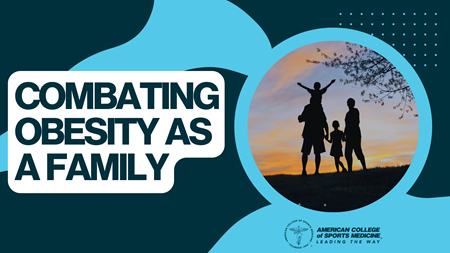Felicia D. Stoler, DCN, M.S., RDN, FACSM |
Sept.
22, 2022

Obesity is one of those diseases that just breaks my heart. After almost 24 years in the health care field, I have not personally witnessed a reduction in this “lifestyle” disease, and the official statistics in the U.S. and worldwide don’t reflect that much progress has been made toward prevention. There are many reasons why obesity remains pervasive, and in many cases it occurs within families — parents, children and often extended family members. When talking about children, the age range is up to 18 years old, and I’m going to do my best to be as inclusive as possible, recognizing that developmentally, there are differences.
My infamous soundbite is that diet and exercise are the least invasive, least expensive and most effective ways of preventing and treating obesity. One of the biggest challenges that we health care professionals have is the abundance of misinformation and so-called experts that perpetuate fads around food, diet and even exercise. Wellness professionals spend quite a bit of time correcting these inaccuracies. Here is what we do know: Parents should lead by example, adopting and practicing healthy lifestyle habits and behaviors. We can learn from the centenarian or longevity regions of the world: eat predominantly plant-based foods with small amounts of animal-sourced protein, participate in physical activity daily, get a good night’s sleep, minimize stress, have loving relationships, be a part of a community, have a purpose, and avoid smoking and excessive alcohol consumption.
Children can be picky eaters — and so can adults. It can take up to 10 exposures to a food before a child may like the food. I always tell families, “Do not be a short-order cook.” You are not a diner offering 500 items on a menu each day. However, when trying new foods, make sure there is at least one thing that everyone is willing to consume at the meal. Most important — this is for the whole family — try to eat food closer to the way it’s found in nature, and cut back on processed foods. Beverages should be predominantly water, 100% fruit juice or milk — no soda, and avoid non-nutritive sweeteners. A great way to develop important life skills is to let your children help you with meal preparation. Stop bribing children with sweets or desserts like cakes, cookies, candy or ice cream!
However, if a child is overweight or obese, do not discuss their body weight with them unless they bring it up. Developing positive self-esteem in children can be challenging. One of the worst things adults can do is criticize their own bodies or let their children see or hear them talking about their body weight. Limit technology time, and try to ensure your children get at least eight hours of sleep each night. Sleep is when the body can rest, repair and renew cells!
Let’s get moving — together! Remember, when discussing movement, let’s use the less-threatening term “physical activity” rather than “exercise.” Assuming everyone is ambulatory, there is no reason to sit or lay down all day long. Assuming kids have not been raised with the TV or technology as their sole source of entertainment or babysitting, most have a lot of energy and love to run around and play. Physical activity as a family includes all movement, even chores around the house: cleaning and yard work count! Try taking a walk together, turning on music and dancing. Better yet, especially in a public playground, get on the swings and pump your legs, try to get across the monkey bars, climb up a ladder and then use the ladder to get back down. Children can walk, jog, bike, board or skate — and so can adults! Take a hike, go to a park that has trails — some even have fit trails with specific exercise stations. Track your steps, and let your kids do the same. Determine the distance and make a game out of it — how many steps would it take to walk across the country? — and determine your family’s progress.
Don’t always park in the closest spot in a parking lot. Get your children accustomed to walking! Teach your kids to take the stairs instead of the elevator, assuming it’s safe. Safe places to walk and play are important. If it can’t be done outside, doing it indoors is the default. Encourage children to PLAY! Until high school, my son’s favorite “subject” was gym or PE. If you have the means, enroll them in sports or classes like dance, yoga or martial arts. Virtual reality arcades have fabulous games that get everyone up and moving! Let kids take the dog out for a walk rather than just letting your pooch loose in the back yard.
My philosophy has been that it is much easier to prevent overweight and obesity than it is to treat them. Modeling appropriate lifestyle behavior choices is foundational. It does not guarantee that your child will always mimic your actions, but at least you are doing it for yourself and exposing your children to it. Physical activity is not about weight — it’s about building bones and muscles, improving cardiopulmonary function, improving mental health, helping with sleep and maintaining appropriate blood sugar and cholesterol.
Let’s give our children the foundation for a lifetime of good health — the habits and behaviors established by the age of 20 impact one’s health over 40!
Related Content:
Resource | ACSM Sports Medicine Basics: Childhood Overweight & Obesity
Blog | Physical Activity: A Key Lifestyle Behavior for Prevention of Weight Gain and Obesity
Pronouncement | Physical Activity and the Prevention of Weight Gain in Adults: A Systematic Review

Dr. Felicia Stoler, DCN, M.S., RDN, FACSM, is a registered dietitian nutritionist, exercise physiologist and expert consultant in disease prevention, wellness and healthful living. She has a bachelors from Tulane University (N’89), a masters in applied physiology and nutrition from Columbia University and doctorate in clinical nutrition from Rutgers University. Felicia is Fellow of the American College of Sports Medicine, a Fellow of the Academy of Nutrition and Dietetics, a Diplomate in Lifestyle Medicine (ACLM); and a Council member of the True Health Initiative. She authored ACSM’s Sports Medicine Basics on Childhood Obesity.